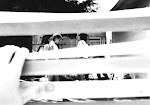
One of the books I read this past year was A Paradise Built in Hell, by Rebecca Solnit. In this book, Solnit looks at major disasters, both man made (like the Blitz) and natural, starting with the 1906 San Francisco earthquake. Her argument is that, contrary to government and popular expectations, during disasters people largely display benevolent behavior. They rush to rescue each other and often band together to provide food, shelter and other help to complete strangers. Far from taking advantage of disorder to indulge in lawless behavior, she writes, people try to re-create it, working together in ad-hoc communities. Though the book is a little repetitive and choppy, her evidence is persuasive and it gives me a little hope in the wake of Tuesday's earthquake in Haiti. The terrible irony of the earthquake there is that in previous natural disasters (like hurricanes) it was the poor who were mainly affected while the government and upper classes marched on indifferently. Now the government is gone and the poor are in the streets. I can't imagine what the future holds for Haiti, but Solnits uses the Mexico City earthquake to show how disasters sometimes bring about real social change. Perhaps the lessons learned in the rubble of Port Au Prince can be used to help Haiti turn a corner.
When you write historical fiction you get used to looking at difficult times in human history and the complexities of human behavior, and partly you try to find some hope in such situations.
In the meantime, I'm terribly proud of my country for taking charge of the rescue efforts. It's good to see people respond so unselfishly.








No comments:
Post a Comment